
In 1970, Earth Day was revolutionary
4/21/2005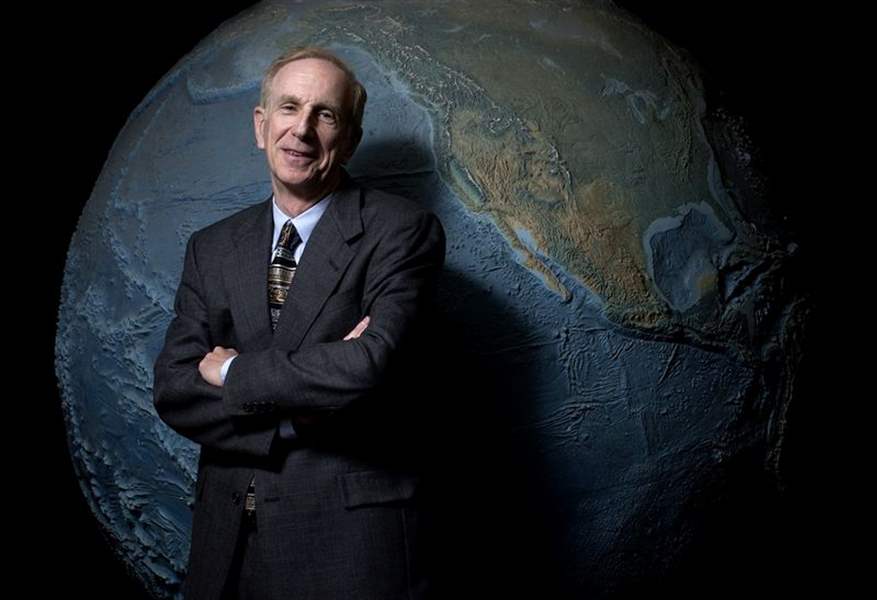
Elliot Tramer stands before a large globe inside the Carlson Library at the University of Toledo. The professor of ecology helped co-organize the first Earth Day event at the university in 1970. The annual commemoration has evolved significantly in Toledo, the nation, and the world in the years since.
Morrison / The Blade
Buy This Image
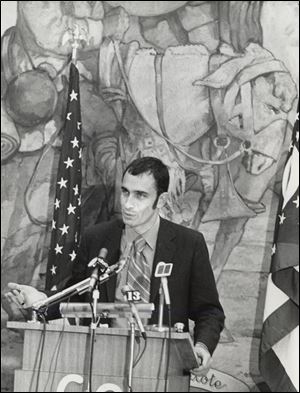
The first Earth Day at UT in 1970: Population expert Paul Ehrlich, was the featured speaker. Mr. Ehrlich contended that humanity was dooming itself through overpopulation.
Thirty-five years ago tomorrow, an estimated 20 million people took part in America s first Earth Day. In so doing, they demanded the federal government act to save the planet before it was too late.
One in every 10 Americans participated. Earth Day 1970 was the largest single-day protest in the nation s history, drawing upon the experiences of college campus teach-ins related to unrest over the Vietnam War.
The mood in Toledo, as in other parts of the country, was tense.
City officials were uptight about Black Panthers patrolling streets.
Residents were edgy after learning about secret U.S. arms shipments to Cambodia. Twelve days later, people everywhere were stunned by the Ohio National Guard s killing of four students at Kent State University.
Many people regarded Earth Day as another excuse for college students to protest, recalled Elliott Tramer, the University of Toledo s first ecology professor and a co-organizer of UT s first Earth Day event.
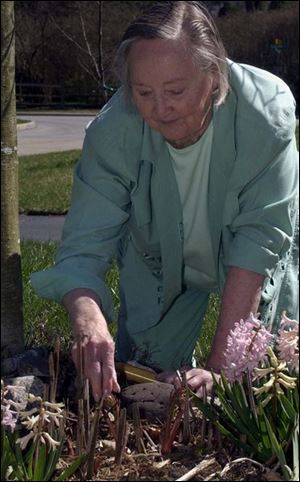
Retired University of Toledo biologist Louise Bankey tends to her garden in Sylvania. She helped co-organize the fi rst Earth Day at UT in 1970.
Even the FBI was skeptical of the motives.
Former U.S. Sen. Edmund Muskie (D., Maine) was incensed to learn that the FBI secretly spied on 40 to 60 events from Earth Day 1970.
He described the surveillance as a threat to our freedom while demanding that Congress investigate.
In the 35 years that have passed, the tone of Earth Day itself seems to have changed as much as the nation s pollution issues and the technology used to address them.
The event has become packaged, marketed, and sold by corporate America, right down to an Internet entrepreneur this year who is using Earth Day to promote a fake bathroom plant designed to conceal a custom-made toilet plunger.
But it s also gotten the notion of environmental stewardship ingrained into the American psyche, down to the grass-roots level in which zoos, park districts, churches, and other groups hold a slew of family-oriented Earth Day activities designed to put people back in touch with nature.
Elementary schools use Earth Day to promote environmental stewardship values to children, who invariably pass them along to their parents, observers note.
None of this is lost on Earth Day s founder, former U.S. Sen. and Wisconsin Gov. Gaylord Nelson.
In his 2002 book, Beyond Earth Day, Mr. Nelson recalled how the ultraconservative John Birch Society accused him of being a communist sympathizer for selecting April 22, 1970, as the first Earth Day because that was the 100th anniversary of Soviet Union founder Vladimir Lenin s birth.
Even today, that society s Web site has a document from July, 1970, posted which shows the group had associated the word ecology with communism.
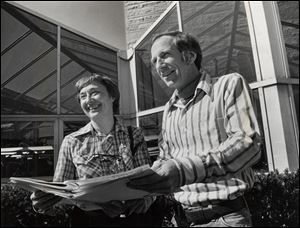
Louise Bankey, left, and Elliot Tramer, who helped organize Toledo s first Earth Day activities, are shown near the UT campus greenhouse.
Mr. Nelson, now 88, deferred requests for Earth Day interviews this year to others because of his ill health. But he said in his book he s not disturbed by how Earth Day s image has evolved.
Corporate America may be giving off mixed signals, but those who dwell on the negative all miss the point of what is actually happening in the real world of changing attitudes, expanding concerns, and public understanding of the environmental challenges we face, he wrote. When I planned the first Earth Day, only one major corporation contributed to our national effort: Arm and Hammer.
Mr. Tramer recalled what a shoestring operation Earth Day 1970 was at UT.
At the time, he was an idealistic first-year professor in his late 20s. He volunteered to help a campus group called For Action and Teaching on the Environment, or FATE. His role included going to then-UT President William Carlson, whose academic specialty was geology, for an allocation of a couple thousand dollars to publicize and host Earth Day activities.
I was never discouraged. I have to credit the university for that, Mr. Tramer said.
UT had a firecracker of a speaker that day: Author Paul Ehrlich, whose controversial 1968 bestselling book, The Population Bomb, had rocked America by suggesting that humanity was dooming itself through overpopulation.
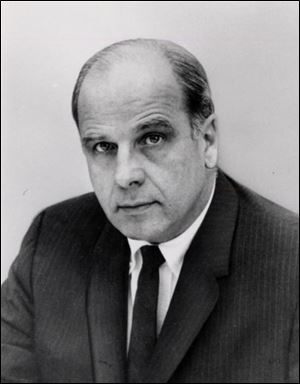
Gaylord Nelson, a former U.S. senator and Wisconsin governor, above, was the founder of Earth Day and was accused of being a communist sympathizer for doing so.
Sylvania resident Louise Bankey, 81, an instructor in UT s biology department in 1970 and a former activist, said it was a fluke that Mr. Ehrlich happened to be on campus that first Earth Day.
Mrs. Bankey said she helped arrange the visit in 1969 on behalf of a Planned Parenthood chapter. She helped Mr. Tramer coordinate UT activities after attending a University of Michigan teach-in about six weeks earlier.
I definitely was called a communist not to my face but certainly through innuendo, she said.
Food production outpaced the apocalyptic famine predictions in the 35 years that have elapsed since Mr. Ehrlich s speech at UT. But he has not wavered from his belief that the planet is on a collision course with doomsday because society won t heed warnings about water and food shortages until it is too late.
The Earth s population was 2 billion when Mr. Ehrlich was born in 1932. It was almost 4 billion when Earth Day 1970 occurred. It is now 6 billion and is expected to exceed 10 billion sometime this century, according to Mr. Ehrlich and several Internet sources.
We should, as rapidly and as humanely as possible, be reducing human population and overconsumption in rich countries, Mr. Ehrlich, a Stanford University professor, told The Blade in a telephone interview from his office in California last week. Obviously, we re doing a lot of silly things. We ve toxified the planet and don t know what we re doing, he said.
The U.S. Environmental Protection Agency was created months after the first Earth Day in 1970. More than two dozen major environmental acts were passed by Congress by 1980. Some international treaties were signed, including the landmark 1972 Great Lakes Water Quality Agreement between the United States and Canada.
Earth Day led to the creation of thousands of jobs in government, academia, and the private sector.
Mr. Tramer recalled how his father thought he was a visionary for getting a Ph.D in ecology when most of America hadn t heard of the word. My father said I was smart to get in on the ground floor and see it was coming, he mused. The truth is, I didn t have a clue it was coming. I just wanted to watch birds for a living.
UT went from hiring Mr. Tramer as its first ecology professor to creating a department with 20 ecology professors.
Ms. Bankey said she became attuned to environmental issues in large part after learning about all the raw sewage that Toledo was allowing into area waterways while her father, Art Niles, was in charge of the city s sewage plant from 1932 to 1960.
Here it is 45 years later and we still haven t fixed the problem, she said.
Toledo is in the midst of a $450 million project to eliminate raw sewage discharges to comply with a U.S. EPA court order. While the city will greatly enhance its sewage network, it concedes there likely will be a few storm events each year in which effluent discharged into the Maumee River will be a mix of partially treated and fully treated sewage.

Elliot Tramer stands before a large globe inside the Carlson Library at the University of Toledo. The professor of ecology helped co-organize the first Earth Day event at the university in 1970. The annual commemoration has evolved significantly in Toledo, the nation, and the world in the years since.
The following is a partial list of Earth Day-related activities. Unless noted, events are free and open to all age groups. Check with sponsoring agencies or groups for more specifics.
Frog Talk. Secor Metropark s National Center for Nature Photography. 7:30 to 9:30 p.m. Discussion about frogs, including a walk into habitat where they can be heard croaking. Reserve a spot by calling 419-407-9701. Co-sponsored by Toledo Area Metroparks and the Ohio Division of Natural Areas and Preserves.
Lead Acid Battery Recycling. AAA Car Care Plus, 308 New Towne Square Drive. Batteries can be dropped off from 7 a.m. to 7 p.m. Sponsored by AAA Northwest Ohio.
Earth Day Extravaganza. Wood County Park District, 18729 Mercer Rd., Bowling Green. Activities for children ages 3 to 5 accompanied by an adult. Reserve a spot by calling 1-800-321-1897 or at www.wcparks.org. Sponsored by Wood County Park District.
Celebrate Earth Day. Toledo Museum of Art s Family Center (west end of building). 11 a.m. to 4:30 p.m. Various Earth Day activities for children. Sponsored by Toledo Museum of Art.
Nature Art: Earth Day Papermaking. Secor Metropark s National Center for Nature Photography. 10 a.m. to noon. Making paper from paper scraps. Reserve a spot by calling 419-407-9701. Sponsored by Toledo Area Metroparks.
Lead Acid Battery Recycling. Johnson Controls Battery Plant, 10300 Industrial Rd., Spencer Township. Batteries can be dropped off at the guard shack between 8 a.m. and 4 p.m. Sponsored by Johnson Controls.
Lead Acid Battery Recycling. AAA Car Care Plus, 308 New Towne Square Drive. Batteries can be dropped off from 7 a.m. to 7 p.m. Sponsored by AAA Northwest Ohio.
Lake Erie Research Center Tour. Lake Erie Research Center off Bay Shore Road, Oregon (next to western edge of Maumee Bay State Park). Tour and speakers, with refreshments. 3 to 8 p.m. RSVP requested. Sponsored by the University of Toledo s chemistry department.
Lead Acid Battery Recycling. AAA Car Care Plus, 308 New Towne Square Drive. Batteries can be dropped off from 8 a.m. to 4 p.m. Sponsored by AAA Northwest Ohio.
Annual Earth Day Celebration. Toledo Zoo. Shark and snake-feeding demonstrations, zookeeper talks, puppet shows, African drum show, Native American storytelling, and other family entertainment. Also will have activity tables and exhibits. Nairobi Events Pavilion will be used if it rains. 10 a.m. to 4 p.m. Sponsored by the zoo and other groups.
Annual Earth Day Aluminum Beverage Can Roundup. Toledo Zoo s Anthony Wayne Trail parking lot entrance. Benefits Aluminum Cans for Burned Children of Northwest Ohio, which administers programs to children in the burn unit of St. Vincent Mercy Medical Center. 10 to 4 p.m. Co-sponsored by the zoo and other groups.
Earth, Our Home. IHM Sisters, Monroe. Includes choral, dance and artistic performance by the Great Lakes Women of Gaia and Monroe City Ballet and Dance, plus exhibits about the River Raisin, Great Lakes, recycling and other issues. 6:30 to 8:30 p.m. Sponsored by IHM Sisters.
A World at Waste. Siena Heights University s Dominican Hall, Adrian. Thirty-minute movie about a young father s impact on the environment, produced by Boomerang Studios and the Lenawee County Solid Waste Department. The movie is being submitted to 30 film festivals. Local showings are at 2 p.m., 4 p.m. and 7 p.m. Question-and-answer session with the director and producer following each showing. Sponsored by Boomerang Studios and the county solid waste department.
The First Wildflowers and Butterflies: Hepaticas and Mourning Cloaks. Swan Creek Preserve Metropark. Glendale entrance. Nature walk in search of wildflowers and butterflies. 1 to 2:30 p.m. Sponsored by Toledo Area Metroparks.
Lead Acid Battery Recycling. AAA Car Care Plus, 308 New Towne Square Drive. Batteries can be dropped off from 10 a.m. to 2 p.m. Sponsored by AAA Northwest Ohio.
Earth Day Celebration. Hedges Boyer Park, Tiffin. Games, crafts, refreshments and door prizes. 2 to 4 p.m. Sponsored by the Franciscan Earth Literary Center, Tiffin Park & Recreation and Seneca Co. Recycling & Litter Prevention.
Native Seed Nursery Volunteer Meeting. Oak Openings Metropark s Buehner Center. Volunteer training for the new Blue Creek Conservation Area. 7 to 8:30 p.m. Reserve a spot by calling 419-407-9747. Sponsored by Toledo Area Metroparks.
Especially for Families: Arbor Day Walk. Secor Metropark s National Center for Nature Photography. Nature hike. 4 to 5:30 p.m. Dress for the possibility of wet soil. Sponsored by Toledo Area Metroparks.